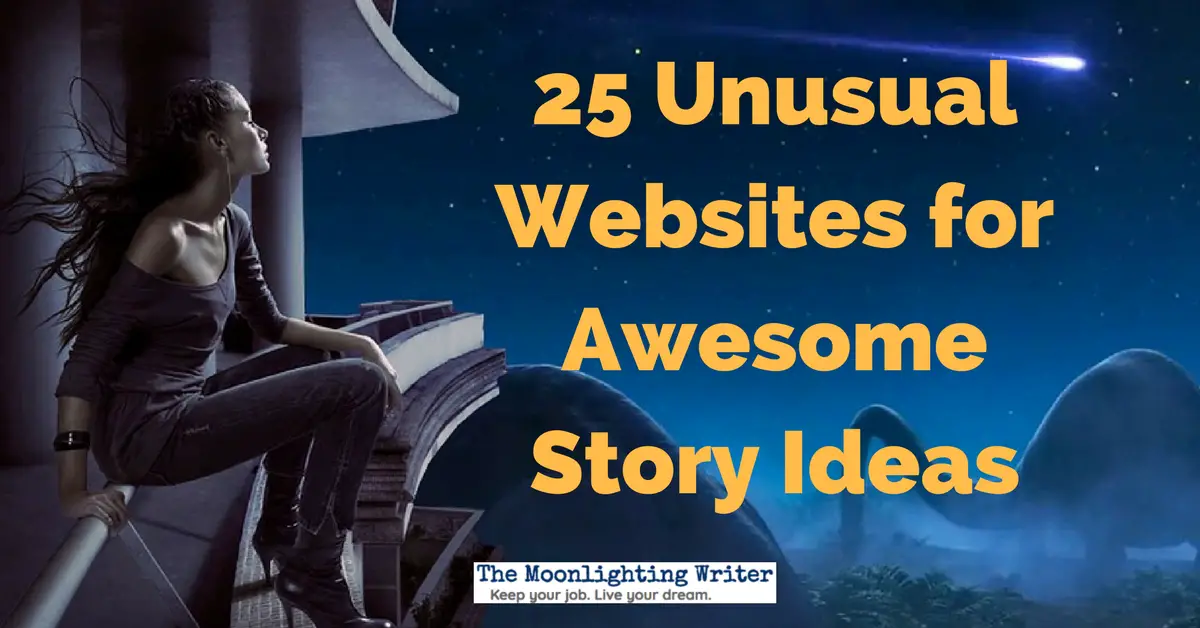[et_pb_section admin_label=”section”][et_pb_row admin_label=”row”][et_pb_column type=”4_4″][et_pb_text admin_label=”Introduction” background_layout=”light” text_orientation=”left” use_border_color=”off” border_color=”#ffffff” border_style=”solid”]
Most of the time, the hardest part about writing is finding the discipline to sit down at your keyboard and actually, you know, write. There are a thousand distractions and a million excuses that keep our word counts low.
But sometimes, the hardest part about writing is knowing what to write. Maybe you have time set aside to tackle a new story or book but your idea well has run dry.
When that happens, you can wait for your muse to show up and risk wasting your precious writing moments, or you can go find your next spurt of inspiration.
Thankfully, we live in the age of instant information, and the next great concept is just a few keystrokes away.
You might not always find your ideas where you’d expect, though.
In fact, there are tons of websites out there that may not seem inspirational at first blush but which are story-building gold mines if you give them a chance.
Here, then, are 25 unexpected websites for finding your next great story idea.
[/et_pb_text][et_pb_text admin_label=”Alltop” background_layout=”light” text_orientation=”left” use_border_color=”off” border_color=”#ffffff” border_style=”solid”]
Alltop
Alltop is a blog directory that includes entries covering just about any broad topic you can think of. The real beauty of this site, though, is that it slaps you in the face with gobs of headlines the moment you hit the front page:

And if none of those do it for you, you can browse or search your way into more detailed niches, with each page delivering dozens of idea-laden post titles:

You could spend all day picking through the information that Alltop delivers to your screen, and I’ve written a guide to help you get the most from this cool tool.
Alltop is pretty self-explanatory, though, and it should yield plenty of stellar story concepts with just a few clicks.
[/et_pb_text][et_pb_text admin_label=”Answer the Public” background_layout=”light” text_orientation=”left” use_border_color=”off” border_color=”#ffffff” border_style=”solid”]
Answer the Public
If you really want to geek out and generate copious ideas at the same time, then Answer the Public is hard to beat.
Now, that may not seem to be the case when you first land on the site and are greeted by this, um, chipper gentleman:

But type in your search term, pick your country, and click “GET QUESTIONS,” and the fun begins:

That results header tells you that there are 160 “questions” for the search term “ghost.” To see what that means, scroll down the page a bit until you see this:

Each of those spokes around the center hub of “ghost” leads to a set of questions that Google and YouTube searchers are asking about your topic. Some interesting entries that caught my eye:
- when ghost hunting gone wrong
- when ghost drive cars
- which ghost was carrying a torch
- where ghost come from
The grammar may not be perfect, but the phrases are evocative.
Scroll down some more and you’ll find the preposition wheel:

In this case, combining “ghost” with various prepositions provides another 139 ideas. Among them are:
- ghost for sale
- ghost without legs
- ghost with yellow eyes
- ghost vs fairy
Again, plenty of story fodder among these.
Finally, the bottom of the page is the mother lode — 1027 search terms formed by combining “ghost” with other words, presented in alphabetical order:

If “ghost of girlfriends past” doesn’t get your spooky synapses firing, well … you’re just not trying, I’m afraid!
[/et_pb_text][et_pb_text admin_label=”Book Title Generator” background_layout=”light” text_orientation=”left” use_border_color=”off” border_color=”#ffffff” border_style=”solid”]
Book Title Generator
At some point in the journey of your next story, you’re going to have to name the thing. If you’re stuck for an idea, why not turn the usual protocol on its head and start with your title?
Book Title Generator lets you do just that by providing you with 48 random word fragments suitable for use as a story title. Here is an example of what you see when you go to the page:

If you don’t like those, click “MORE” to get another set.
Not only does Book Title Generator spit out great title ideas that can spark your imagination, it also makes use of one my favorite power tools for writing — randomness.
No matter how hard you try to think of new ideas, your mind always tends to track into the same narrow lanes it’s driven before. That’s why the shuffle feature of MP3 players can be great for discovering new music, and it’s why random generators are awesome for leading you to new reaches of your fiction.
It’s a theme we’ll see again and again.
[/et_pb_text][et_pb_text admin_label=”Cube Monkey Random Quote Generator” background_layout=”light” text_orientation=”left” use_border_color=”off” border_color=”#ffffff” border_style=”solid”]
Cube Monkey Random Quote Generator
That didn’t take long, did it?
The Cube Monkey Random Quote Generator does just what its name says — generates random quotes for your consumption and noodling.
Just be forewarned that the page will be pretty empty when you first arrive:

That’s easy enough to fix, though. Select the number of quotes you want to see and click the “Generate Quotes” button:

You can refresh the list as many times as it takes to find inspiration, and you can also pick different categories. Just keep randomizing until you find your story idea.
[/et_pb_text][et_pb_text admin_label=”ExplainThatStuff Random Article” background_layout=”light” text_orientation=”left” use_border_color=”off” border_color=”#ffffff” border_style=”solid”]
ExplainThatStuff Random Article
ExplainThatStuff is a site heavy on science and technology but dedicated to presenting that heady information in a way that the Average Joe can “get” without getting bogged down in stuffy language or esoteric jargon.
Here’s what the front page looks like:

You can get some good ideas from the homepage or by clicking into the most read articles, but what I really like here is (surprise!) the “Random article” link:

I see “steam engines,” and my mind immediately races to scenes from the old west. If the choo-choos don’t do it for you, just randomize again.
You can also go directly to a random article at ExplainThatStuff by hitting their randomizer page.
[/et_pb_text][et_pb_text admin_label=”Google Search” background_layout=”light” text_orientation=”left” use_border_color=”off” border_color=”#ffffff” border_style=”solid”]
Google Search
Google Search? Don’t you already have to have an idea to get anything useful from Google Search?
Well, sort of, but it can be pretty broad.
For instance, let’s say I know I want to write something about ghosts. I can just start with that simple query and see what shakes loose:
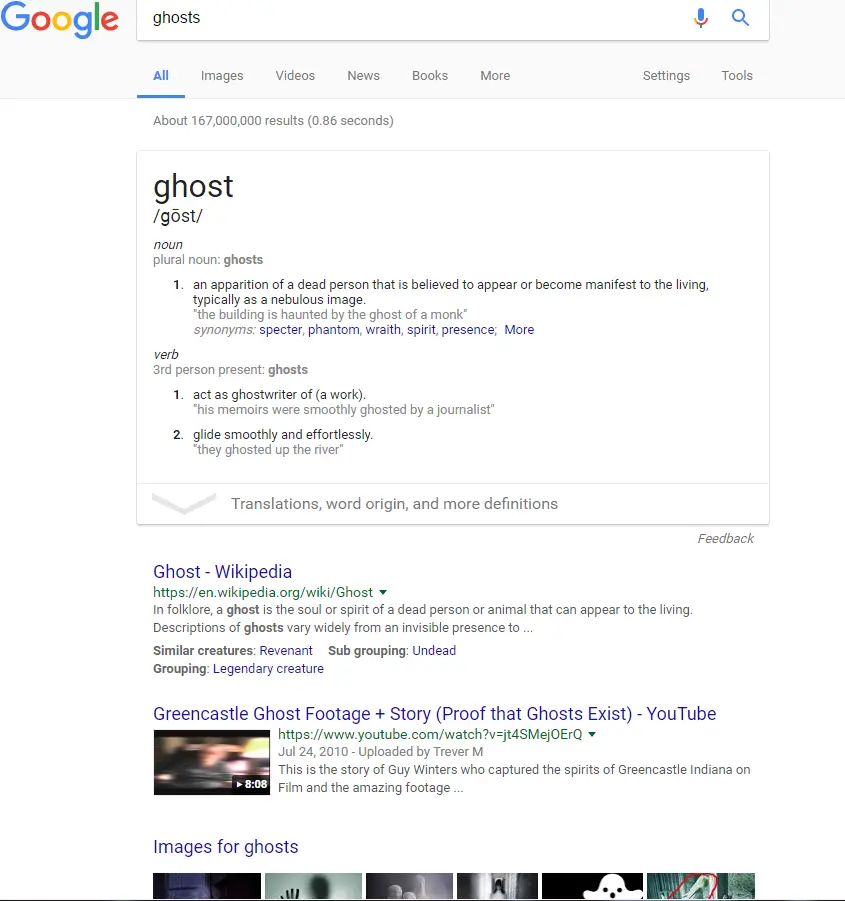
Nothing too exciting there, though you do get a glimpse of a few provocative images above the fold. Scroll all the way to the bottom of the search results, though, and things start to get interesting:
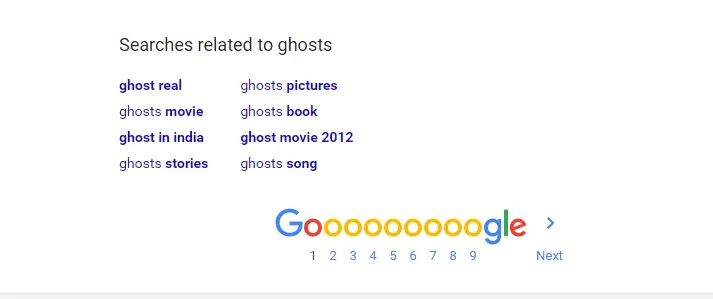
Google’s “related searches” can be a great place to find concepts you may not have considered on your own, and in this case, my hackles are tweaked by the idea of ghosts in other countries. Let’s click on “ghost in india”:
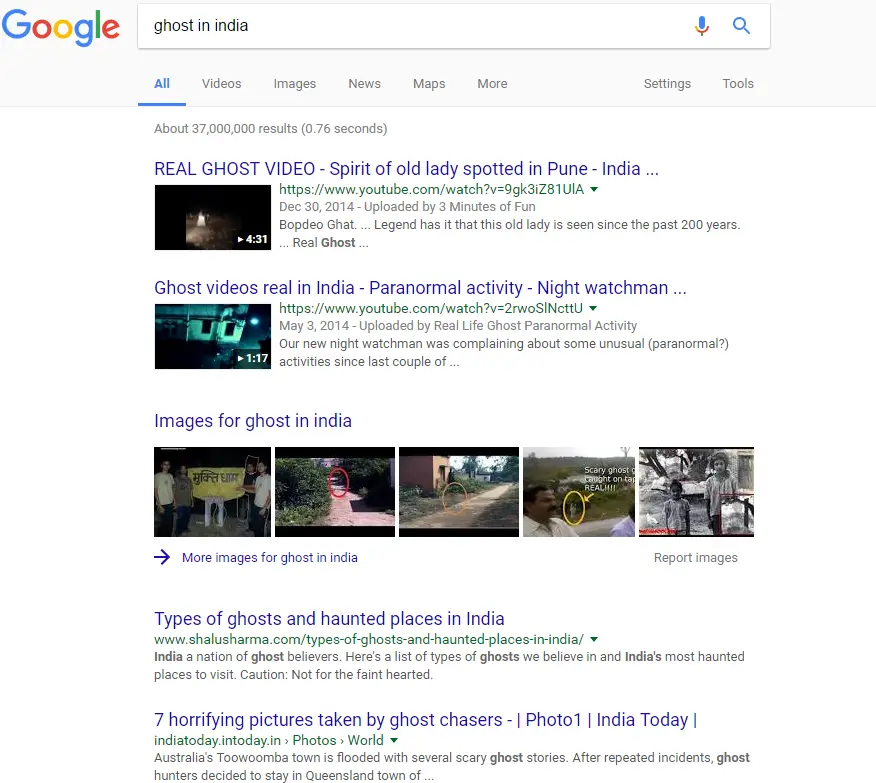
Now those results are a little juicier! I think I could craft a story from some of those pictures, for sure. Finally, let’s check out the related searches at the bottom of this page:
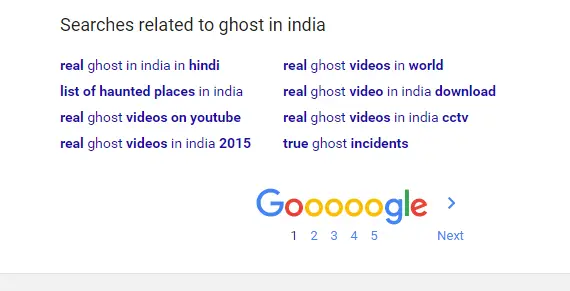
The phrases are getting longer and more detailed, meaning there’s a better chance something will “click” for your storytelling imagination. For me, “real ghost videos in india cctv” is creepy as all get-out, and I have a river of scary story ideas rushing through my brain. I think I’ll have to go write one of them!
[/et_pb_text][et_pb_text admin_label=”The Idiomatic” background_layout=”light” text_orientation=”left” use_border_color=”off” border_color=”#ffffff” border_style=”solid”]
The Idiomatic
Google defines idiom as:
a group of words established by usage as having a meaning not deducible from those of the individual words (e.g., rain cats and dogs, see the light ).
Idioms are great for generating story ideas because you can play off both their literal meanings — what would happen if it really rained cats and dogs? — and their figurative meanings — what sorts of things might happen in a torrential rainstorm?
The Idiomatic takes this one step further by mashing up many of the idioms we all know and love (or hate) to produce new, sometimes goofy sentences:

If you don’t like the hand you’re dealt, click on it to get another — yes — random helping of idiom soup.
[/et_pb_text][et_pb_text admin_label=”Indeed” background_layout=”light” text_orientation=”left” use_border_color=”off” border_color=”#ffffff” border_style=”solid”]
Indeed
You can’t really glean story ideas from a jobs website, can you?
Well, you’re a writer, so you can pick up story ideas just about anywhere. Sites like Indeed make it pretty easy, though.
There’s not too much inspiring about the front page …
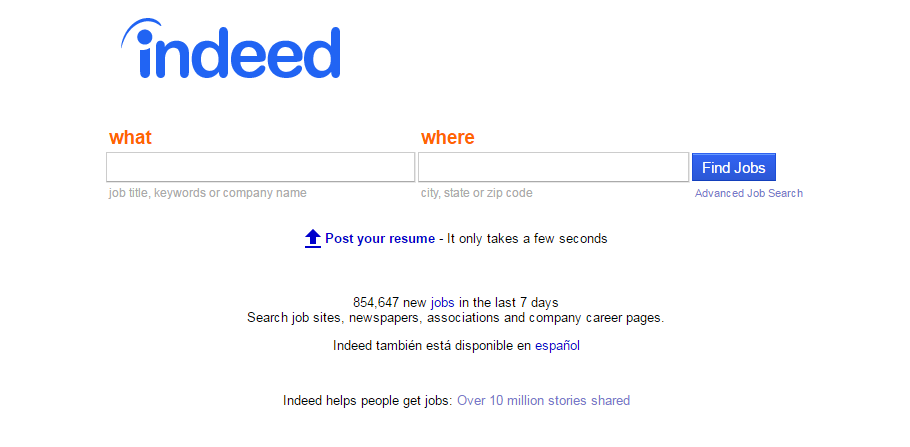
… but type in a “what” or a “where” and things change. Here is what got when I used “texas” as my where:
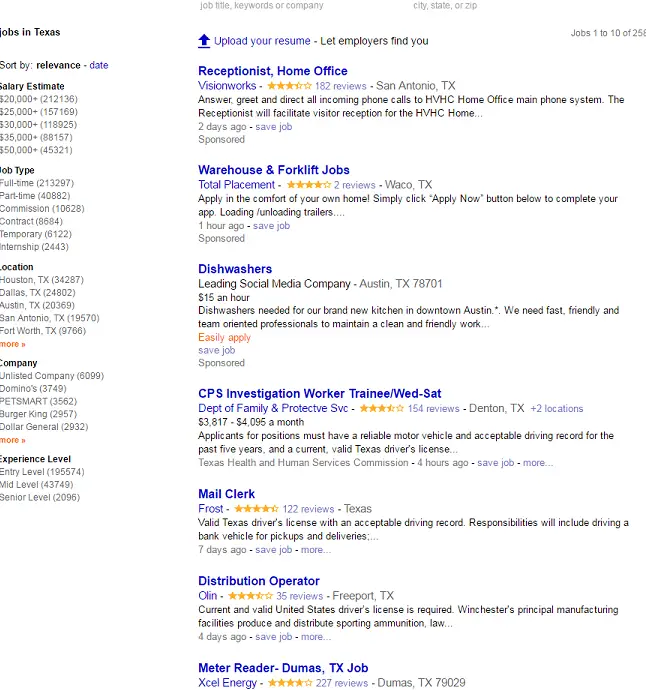
How can you use these listings to come up with story ideas?
Easy … imagine the person who might fill each of these roles. What would he look like? How would he act? How old is he? Is he a she?
Really get to know your fictitious job applicant and then figure out what might be happening in his life that makes him remarkable. We’re all interesting in the right light, and your job is to draw out the unique story of that meter reader or CPS investigator.
[/et_pb_text][et_pb_text admin_label=”Linkbait Title Generator ” background_layout=”light” text_orientation=”left” use_border_color=”off” border_color=”#ffffff” border_style=”solid”]
Linkbait Title Generator
Linkbait has gotten a bad name (for good reasons), but Content Row’s Linkbait Title Generator is unapologetic in life’s purpose — to build clickable headlines around the keywords you provide. As with the Portent tool further down this list, that blog-focused mission shouldn’t keep you from mining this gem for story ideas.
Just go to the Linkbait Title Generator page and enter your keyword:

Plenty of good ideas here if you’re willing to stretch your imagination a bit. Some that spring to mind for me include:
- A news reporter who is actually a ghost
- Intimacy between ghosts and the living
- “Using” a ghost to accomplish everyday tasks
- Ghosts who actually suck the life out of you
Jeepers!
[/et_pb_text][et_pb_text admin_label=”Online Dating Ipsum” background_layout=”light” text_orientation=”left” use_border_color=”off” border_color=”#ffffff” border_style=”solid”]
Online Dating Ipsum
We’ve all seen those blocks of (mostly) nonsensical Latin text that start with lorem ipsum. They can be found on new WordPress blogs, templates of all sorts, and anywhere else when some text is needed for aesthetic purposes but where the meaning of those words doesn’t matter.
Lauren Hallden noticed that most online “profiles are just word soup anyway” and combined that thought with the lorem ipsum scheme to produce the Online Dating Ipsum:

To get the goods here, just pick your options — number of paragraphs and either jabber or crazy sauce — and then “Get it over with”:
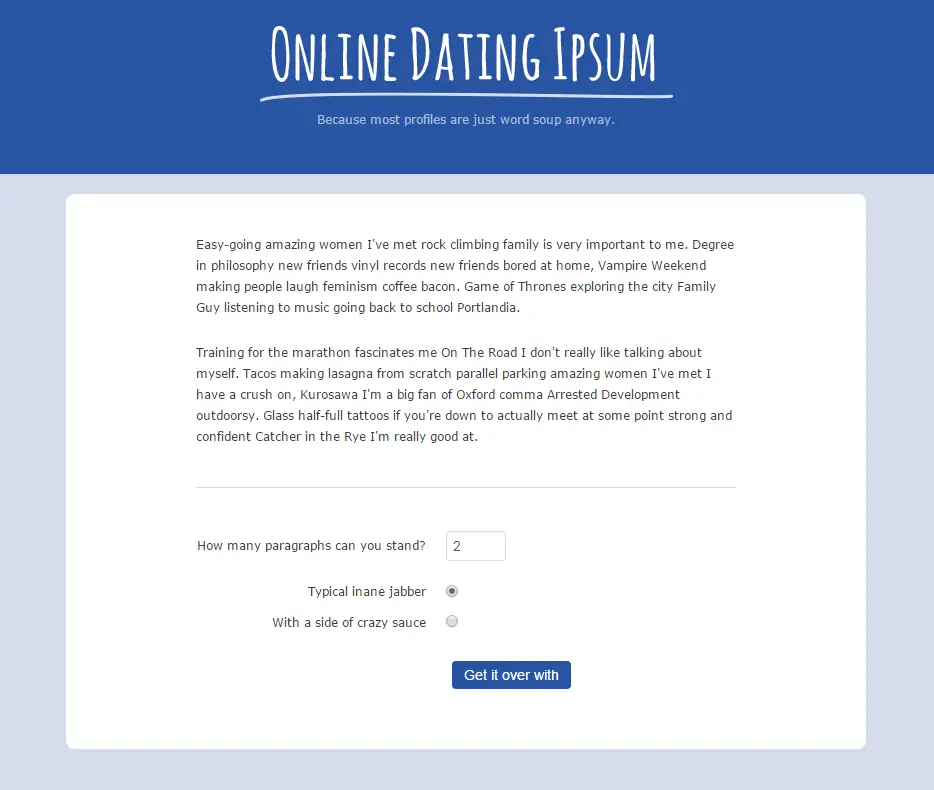
Now, admittedly, there is a bunch of gobbledygook in the results, but there are usually some provocative nuggets in there, too. In this particular example, story-prompting phrases that stand out to me are:
- Easy-going … women I’ve met rock climbing …
- Vampire Weekend
- Glass half-full tattoos
- Tacos making lasagna from scratch
- Parallel parking amazing women
This is not your average inspirational fare, but then, that’s the whole point, isn’t it? To bust out of your rut?
[/et_pb_text][et_pb_text admin_label=”Pinterest” background_layout=”light” text_orientation=”left” use_border_color=”off” border_color=”#ffffff” border_style=”solid”]
Like Pixabay (below), Pinterest is largely a visual platform. What sets Pinterest apart, though, are its thriving community and the customized experiences you can build on the platform over time.
Even just visiting the front page will unleash a flood of potential story ideas:

But, of course, you can also search:

Or, you could look for Boards related to your search:

And, if you follow those boards, you’ll see updates to them as you interact with your account in the future.
In addition to being a rich source of inspiring images, Pinterest is also home to an ardent community of writers, many of whom host boards devoted to writing prompts, writing craft & tips, and other word-related topics.
[/et_pb_text][et_pb_text admin_label=”Pixabay” background_layout=”light” text_orientation=”left” use_border_color=”off” border_color=”#ffffff” border_style=”solid”]
Pixabay
If you prefer flat-out visual inspiration, then you can choose from the many picture sites on the web. One of my favorites is Pixabay:

Type in a search term, like “ghost,” and you’re instantly rewarded with a barrage of related images:

Of course, you could just use the Explore feature
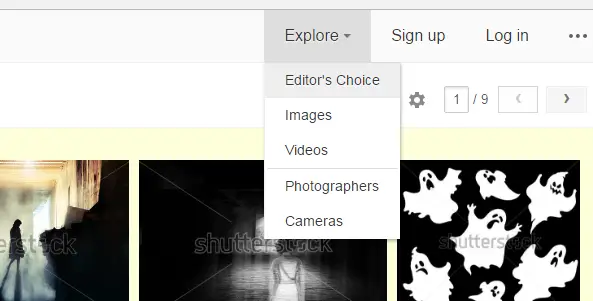
to generate more or less random pictorial writing prompts:

Maybe the best part is that Pixabay is jammed packed with images you can use freely in your own work if you want. (Just check the license terms to be sure you have the rights you need.)
[/et_pb_text][et_pb_text admin_label=”Portent’s Content Idea Generator” background_layout=”light” text_orientation=”left” use_border_color=”off” border_color=”#ffffff” border_style=”solid”]
Portent’s Content Idea Generator
Another tool ostensibly made for bloggers, Portent’s Content Idea Generator is super simple to use. Just navigate to the page:

… then enter your keyword and click the arrow:

… and, well, that’s it.
Now, to be sure, you’re going to get some clickbait-type titles, but they can still jog loose good story ideas. For instance, in this case, I was dealt, “12 Facts About Ghosts That’ll Keep You Up at Night.”
How about a fictional story detailing how a scientist accidentally stumbles onto the truth about ghosts? Or maybe a humor piece from a ghost’s POV, dishing out straight dope on the afterlife?
They sound like winners to me!
[/et_pb_text][et_pb_text admin_label=”Random Bible Verse” background_layout=”light” text_orientation=”left” use_border_color=”off” border_color=”#ffffff” border_style=”solid”]
Random Bible Verse
This one may be controversial, but you can’t deny that it’s unexpected, right?
And really, no matter your religious affiliation or whether you’re religious at all, the truth is that The Bible contains some of the greatest stories ever written (even if the writing itself is a bit difficult). Why ignore such a valuable repository of writing ideas?
To get your first Bible verse, just head over to the DailyVerses site:

Darkness, prisoners, poor, brokenhearted — plenty of story fodder here.
And this is yet another site that harnesses the power of random: if you don’t like your blurb, just “Show another verse!”.
[/et_pb_text][et_pb_text admin_label=”RandomLists Random Word Generator” background_layout=”light” text_orientation=”left” use_border_color=”off” border_color=”#ffffff” border_style=”solid”]
Random Word Generator
One of my favorite forms of writing prompt is taking a random list of words and crafting them into a story. The Random Word Generator from RandomLists is a great way to come up with these seed words:

Just pick a few words — I like using 3 most of the time — and go to town.
[/et_pb_text][et_pb_text admin_label=”Reddit” background_layout=”light” text_orientation=”left” use_border_color=”off” border_color=”#ffffff” border_style=”solid”]
Everyone knows that Reddit is “The Front Page of the Internet,” but have you ever viewed that feed of interesting stories through your author’s lens? Here’s what the “hot” tab looked like when I opened up Reddit today:

There are some intriguing ideas here, even above the fold:
- The achievement of an impossible dream
- Time travel and/or wormholes
- Tickle sharks (!)
- Places in our own houses we’ve never seen
- Time-lapsed photos spanning nearly 40 years
Awesome stuff, and you can always find more ideas by digging through the various Subreddits. One of my favorite ways to do that is to use the “random subreddit” link at the bottom of the front page:

Here’s what that got me:

So, yeah, “Sports Are Fun,” and so are some of the stories in this Subreddit. If they don’t inspire you, though, the RANDOM feature is still available to you, at the top of the page:

Just click it to find your next Subreddit and, hopefully, your next bit of inspiration.
[/et_pb_text][et_pb_text admin_label=”Seventh Sanctum – Writing Prompt Generator” background_layout=”light” text_orientation=”left” use_border_color=”off” border_color=”#ffffff” border_style=”solid”]
Seventh Sanctum – Writing Prompt Generator
Sometimes, nothing will get your creative juices flowing like a good, old-fashioned writing prompt. The Seventh Sanctum Writing Prompt Generator takes that basic idea and combines it with the power of random numbers and the accessibility of the Internet to give you a huge array of potential story ideas.
It all starts by navigating the Writing Prompt Generator page:

If you don’t like the prompts you’re dealt the first time, just hit “Generate More Prompts” until your muse shows up.
[/et_pb_text][et_pb_text admin_label=”Soovle” background_layout=”light” text_orientation=”left” use_border_color=”off” border_color=”#ffffff” border_style=”solid”]
Soovle
Soovle takes the idea of Google’s related searches and expands it to include a host of other search engines and sites: Wikipedia, Answers.com, Netflix, YouTube, The Weather Channel, bing, Yahoo!, Buy.com, ebay, and Amazon.com at last check.
The front page has a place for your search term plus empty results panes for each of the sites it supports:

To see something more beefy, start typing your term and watch those empty panes fill in:

It’s interesting to note that the Google results here are slightly different than Google’s own related searches, which is a good thing. The more variety the better as far as generating story ideas is concerned.
Note that if you click the Soovle button, you’ll be transported to the results page of whichever search engine is at the top of your Soovle search page. You can adjust that order by clicking on a search engine icon under the search box to move it to the top or by pressing the right arrow key on your keyboard
[/et_pb_text][et_pb_text admin_label=”Story Shack Writing Prompt Generator” background_layout=”light” text_orientation=”left” use_border_color=”off” border_color=”#ffffff” border_style=”solid”]
Story Shack Writing Prompt Generator
The Story Shack Writing Prompt Generator is another tool that combines old-time story prompts with modern web concepts.
Presenting a slick, clean design, the Writing Prompt Generator invites you to “Generate” a new prompt through a big green banner at the top of the page:

When you click that button, the gear turns for a few seconds, and then the Generator gives you a complete set of story parameters:

As you can see, you get a target word count, a genre, a protagonist, an object or material, and a prompting sentence.
So, unlike other similar tools, Story Shack provides both the raw material — the prompt — and some context against which to write. It’s a powerful concoction that can rocket you from no idea at all to the middle of your story-crafting process within seconds.
[/et_pb_text][et_pb_text admin_label=”StumbleUpon” background_layout=”light” text_orientation=”left” use_border_color=”off” border_color=”#ffffff” border_style=”solid”]
StumbleUpon
When it comes to random resources on the Internet, it’s hard to beat StumbleUpon. Bringing you random bits of goodness — through randomly selected web pages — is its entire reason for being.
To get started, navigate to StumbleUpon.com and see what pops up. Here is what I got today:

This is pretty much in my wheelhouse, and that’s no accident because StumbleUpon remembers where you’ve been and lets you add categories that are important to you. Unfortunately, once you’ve been bounced to a page, you have to reload StumbleUpon to get to another page.
The way around this problem is to use the StumbleUpon Chrome add-on. Once you’ve added this utility, you’ll get a StumbleUpon toolbar at the top of each page:

From there, you can control your settings, give thumbs up or down to the page you’re currently viewing, and “stumble” to another page.
Just be careful, because Stumbling is extremely addictive and you might find your hours dripping away in obscure corners of the web you never even knew existed.
[/et_pb_text][et_pb_text admin_label=”Twitter” background_layout=”light” text_orientation=”left” use_border_color=”off” border_color=”#ffffff” border_style=”solid”]
Twitter may seem like an odd choice as a source of writing inspiration, but hear me out.
While it’s true that social media in general has developed a well-deserved reputation for sucking us dry of our precious time and of exposing buffoonery throughout society, that does not mean it is completely without merit.
When it comes to generating new story ideas, in fact, Twitter in particular can be a Godsend. There are a lot of ways you can mine the secret story sauce from among a sea of Tweets, but one of the best and easiest is to simply dive into a few specific hashtags.
For instance …
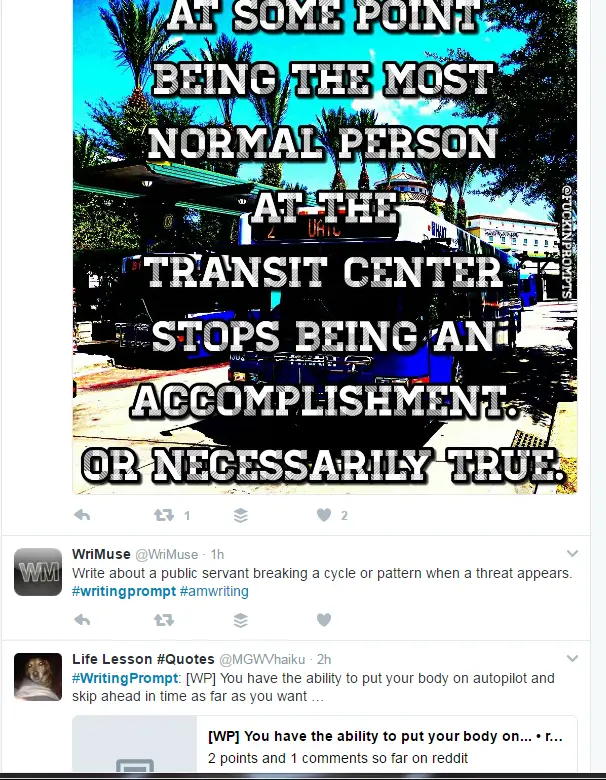
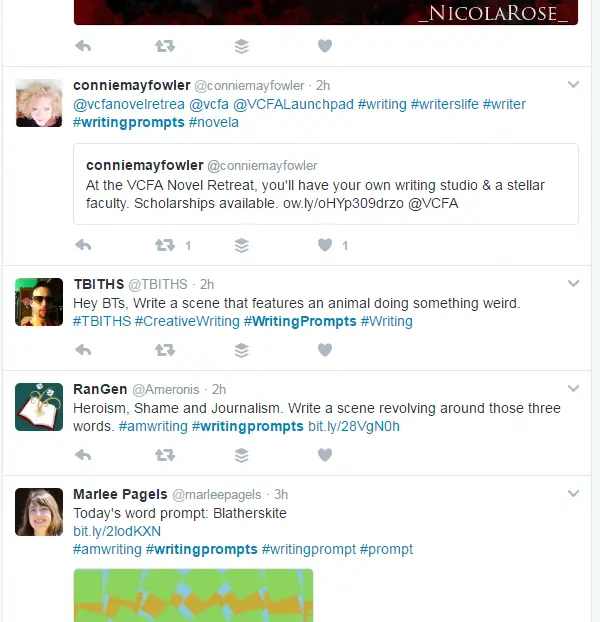
I’m sure you can find others, too, but just these three hashtags will keep you in the story-writing clover for years.
[/et_pb_text][et_pb_text admin_label=”Ubersuggest” background_layout=”light” text_orientation=”left” use_border_color=”off” border_color=”#ffffff” border_style=”solid”]
Ubersuggest
Ubersuggest takes a keyword you supply and “suggests” related words and phrases based on Google’s autocomplete and “related searches” functionality. Ubersuggest is generally thought of as a tool for bloggers in search of article ideas, but you can also use it to help generate story ideas. To get started, navigate to the Ubersuggest homepage:

Then, type in an idea keyword, like “ghost”:

… and scroll through the results until you see something that sparks your imagination:
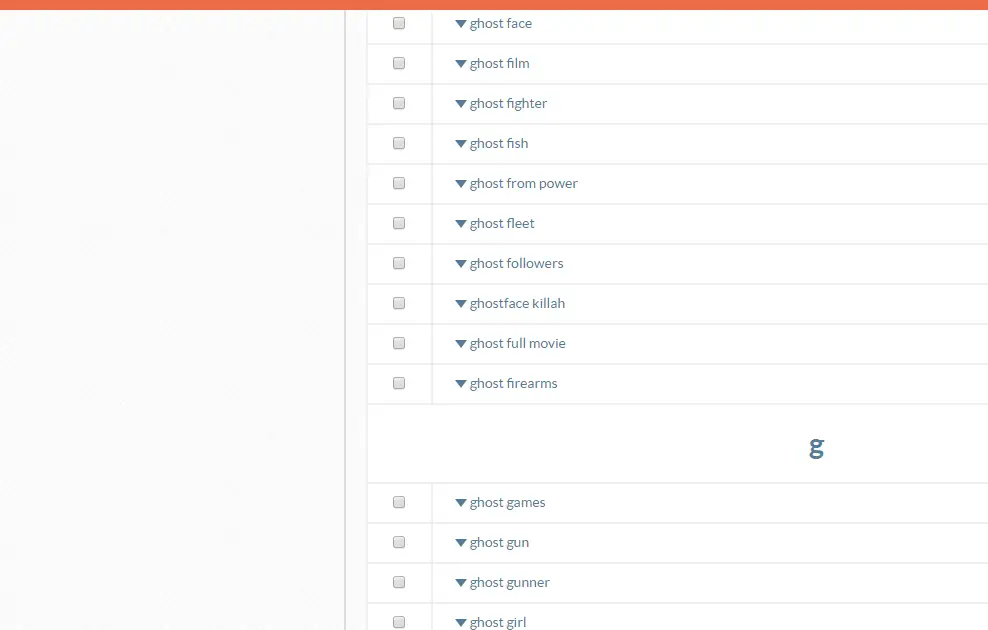
Ghost fish? Ghost brothers? Ghost bikes? Oh, yeah!
And, if you like, you can click into each term to perform a Google search, dive into Google Trends, or expand your results based on the clicked keyword.
If that’s still not enough for you, Ubersuggest holds one, final uber cool feature. Word clouds (second tab of search results):
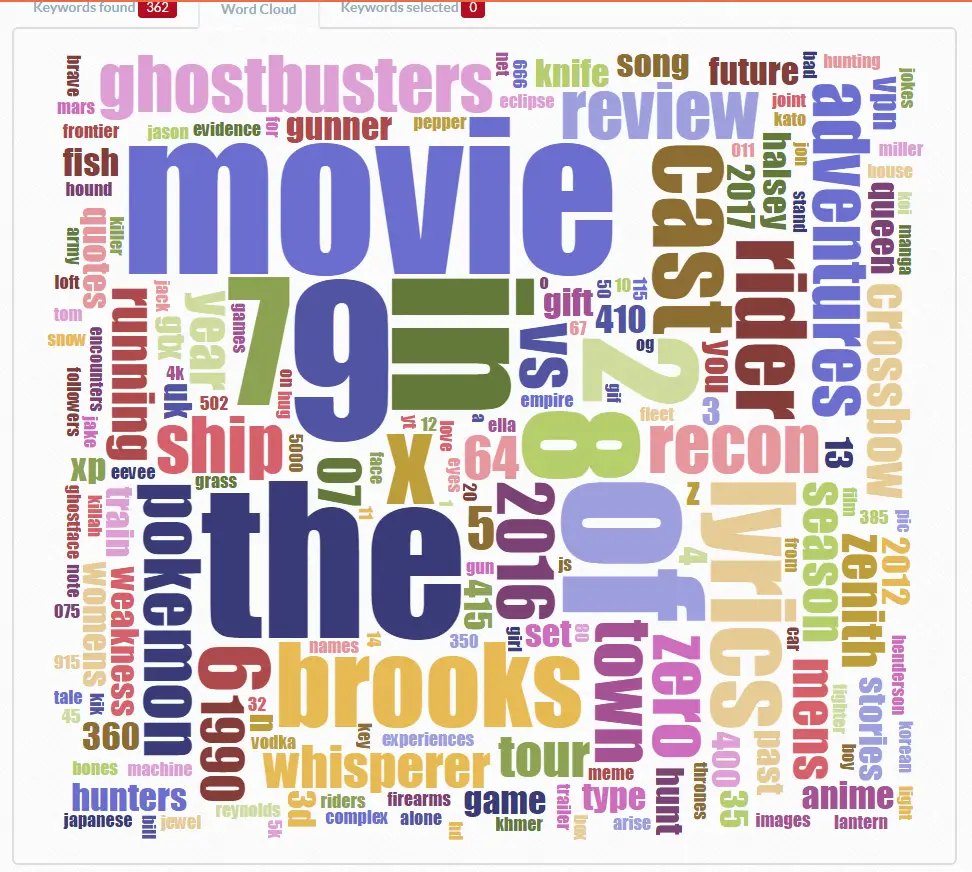
[/et_pb_text][et_pb_text admin_label=”The Useless Web” background_layout=”light” text_orientation=”left” use_border_color=”off” border_color=”#ffffff” border_style=”solid”]
The Useless Web
The Useless Web takes StumbleUpon’s basic premise — delivering you to a random website — and ups the ante by delivering you to a random useless website. It says as much right there in its name and on its minimalist front page:

Click PLEASE, and you’re transported somewhere strange and mysterious, and maybe useless:

In this case, I could definitely come up with a story based on, “Bury me with my money,” but you may not always be so lucky. If not, just go back to The Useless Web — which is still open in your original browser tab, unlike StumbleUpon, and PLEASE yourself again.
[/et_pb_text][et_pb_text admin_label=”Wikipedia” background_layout=”light” text_orientation=”left” use_border_color=”off” border_color=”#ffffff” border_style=”solid”]
Wikipedia
As you are undoubtedly aware, Wikipedia contains an almost unfathomable amount of content, all curated by us, the citizens of the World Wide Web.
What you may not have considered is just how valuable Wikipedia can be to authors looking for their next story idea. There are so many nooks and crannies for you to poke around that you should never run out of story ideas. In fact, I like Wikipedia as a muse so much that I put together a complete guide for milking ideas from this crowdsourced giant.
But if I were to pick just one way to use Wikipedia to find your next story idea, it would be the “Random article” feature. To get there, first go to the Wikipedia homepage:

Then enter anything into the search box and click on a result.

Once you’re on a page, you’ll find the “Random article” link in the upper left-hand corner.
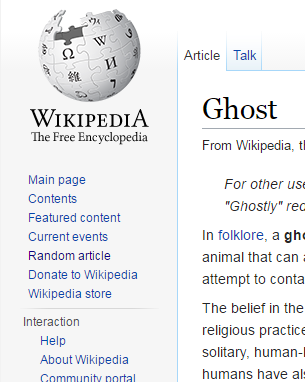
Click that, and you’re off to the races:

As with the other random generators on this list, you can click again and again until you find what you’re looking for.
And, if you don’t want to go through the front door, you can just hit the random-article generator directly here.
[/et_pb_text][et_pb_text admin_label=”WritingExercises Random Image Generator” background_layout=”light” text_orientation=”left” use_border_color=”off” border_color=”#ffffff” border_style=”solid”]
WritingExercises Random Image Generator
The Random Image Generator from WritingExercises does exactly what you would expect — delivers random images:

To get a new shot of inspiration, just click “New Image.”
I can’t think of a better way to close out our bag of story idea generators than with this gem that combines two of the most powerful tools for inspiring creative thought — images and randomness.
Now … find your idea and then go write!
[/et_pb_text][et_pb_text admin_label=”Butt-In Seat Inline Opt-In” background_layout=”light” text_orientation=”left” use_border_color=”off” border_color=”#ffffff” border_style=”solid” saved_tabs=”all”] [et_bloom_inline optin_id=”optin_12″] [/et_pb_text][/et_pb_column][/et_pb_row][/et_pb_section]
